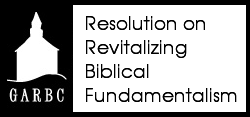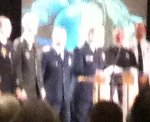Friday at the annual conference of the Fellowship of Grace Brethren Churches
The annual Conference of the Fellowship of Grace Brethren Churches began Friday, July 16, 2010 at the Crowne Plaza Hotel in Sharonville (Cincinnati), Ohio. The Conference held its first celebration-style meeting on Friday evening. Saturday was dedicated to the service project “We Care Miami Valley,” with various scheduled activities in Dayton and Xenia, Ohio. Later that evening there was a combined
Discussion
Now, About Those Differences, Part Seven
 Read Part 1, Part 2, Part 3, Part 4, Part 5, and Part 6.
Read Part 1, Part 2, Part 3, Part 4, Part 5, and Part 6.
Second Premise Arguments
Making generalizations about either fundamentalists or other evangelicals is a bit presumptuous. Both groups are quite diverse, and exceptions can be found to most generalizations. Non-fundamentalistic evangelicalism covers an especially broad array of influences and movements.
The diversity of each group has rarely been realized by the other, however, and so each group does tend to posit generalizations about the other. One of those generalizations has to do with the matter of worldliness and legalism. Fundamentalists tend to think of other evangelicals as worldly. Those evangelicals tend to think of fundamentalists as legalistic.
We are not yet to the point of weighing the merits of these perceptions. For the moment, what we are trying to do is to understand what each group means when it speaks about the other. What do fundamentalists see that leads them to think evangelicals are worldly? What do evangelicals see that leads them to perceive fundamentalists as legalistic?
Articulating these perceptions more fully will be useful in two ways. First, it will furnish us with criteria for assessing the merits of the judgments that evangelicals and fundamentalists make about each other. Second, it will provide us with a device for distinguishing some evangelicals from other evangelicals as well as some fundamentalists from other fundamentalists.
Discussion
Now, About Those Differences, Part Six
 Read Part 1, Part 2, Part 3, Part 4, and Part 5.
Read Part 1, Part 2, Part 3, Part 4, and Part 5.
Standards of Conduct
When evangelicals think about fundamentalists (which is not often), they typically consider them to be rather legalistic. When fundamentalists think about other evangelicals (which is nearly constantly), they usually consider them to be quite worldly. The purpose of the present investigation is not to endorse either indictment but to identify what each party has in mind when it levels its accusation against the other.
What do fundamentalists perceive about evangelicals that seems worldly to them? What do evangelicals see in fundamentalists that seems legalistic? The answer to these questions primarily revolves around two areas: (1) standards of conduct, and (2) methods of ministry. Each of these areas is significant enough to warrant at least one essay of its own.
By “standards of conduct,” I do not mean to suggest that one party possesses standards while the other does not. Both parties agree that the Bible says something about how people should live. Both parties recognize that biblical commands and principles, rightly applied, require or prohibit particular activities. Both parties will, at some point, use some external standards of conduct as mechanisms by which to gauge spiritual wellbeing.
Making such evaluations is not necessarily legalism. Legalists believe that their external conduct actually secures some measure of standing with God. That is a different matter than recognizing that external conduct often reflects one’s relationship with God.
Discussion
Fighting the Bantam Roosters: Baptist Fundamentalism Still Grapples with Its Colorful Heritage
 Ninety years ago we gave ourselves a name: Fundamentalists.
Ninety years ago we gave ourselves a name: Fundamentalists.
“We suggest that those who still cling to the great fundamentals and who mean to do battle royal for the great fundamentals shall be called ‘Fundamentalists,’” wrote Curtis Lee Laws in the July 1, 1920 issue of the Watchman-Examiner, a Baptist newspaper with loose ties to the Northern Baptist Convention.
And 90 years later, we still discuss the implications of the Fundamentalist label. Back then, the issues seemed crystal clear: either you believed the Bible was true, or you didn’t. Simple to articulate and easy to defend, the idea of Fundamentalism was expressed as core doctrinal beliefs. Lines were drawn. Positions were staked. Ink was spilt, often.
But language is elastic, meaning is elusive, and sometimes words just wear out.
Discussion
Now, About Those Differences, Part Five
 Read Part 1, Part 2, Part 3, and Part 4.
Read Part 1, Part 2, Part 3, and Part 4.
Legalism and Worldliness
Over the decades, fundamentalists and other evangelicals have played a kind of game. It is a contest of mutual recrimination. To fundamentalists, evangelicals have often said, “You are legalists.” Fundamentalists have generally replied, “You are worldly.” Both parties seem to find pleasure in this game, though neither has ever really won it.
Of course, most evangelicals are not conservative evangelicals. In common with other evangelicals, however, conservative evangelicals still tend to view fundamentalists as unnecessarily legalistic. For their part, many fundamentalists are not even willing to recognize a difference between conservative evangelicalism and other branches of non-fundamentalistic evangelicalism (usually classed under the broad label, “neo-evangelical”). These fundamentalists believe that any evangelical who is not a fundamentalist is a new evangelical and simply must be worldly.
An uninformed observer might wonder what all the fuss is about. One group observes some strictures that the other does not. Why worry about it?
The answer is that Christianity is more than a set of doctrines. Christianity is also a life lived for the love and to the glory of God. Just as some doctrinal affirmations or denials are not compatible with the gospel, so also some ways of living are not compatible with the gospel.
Discussion
Resolution on Fundamentalism
On Wednesday, the association passed a resolution on the subject of Fundamentalism and its future and the association’s relationships with respect to Fundamentalism. The resolution is especially interesting in light of the two “non GARBC” keynote speakers this year, Tim Jordan and Dan Davey. Look for an article soon including the text of the resolution as well some perspective from Jordan, Davey and others.
Discussion
Thursday Evening Update: Spiritual Warfare
Responsive Scripture Reading: Psalm 96:2-3, 7a-10
Songs: Holy, Holy, Holy; You Are Holy
Oral Interpretation of the Scriptures – Talent for Christ winner Emily Wiedemeir (First Baptist Church, Carroll, IA)
Male Voice – Talent for Christ winner Zac Singletary (First Baptist Church, Wellington, OH)
Invitation to 2011 Conference in Denver, CO
Offertory: Piano – Talent for Christ winner Sarah Parsons (Youngs Corners Fellowship Church, Wadsworth, OH)
Service Awards for Youth – presented by Lance Augsburger and John Greening
Discussion
Thursday Morning Highlights

Discussion
Earthen Vessels

Discussion